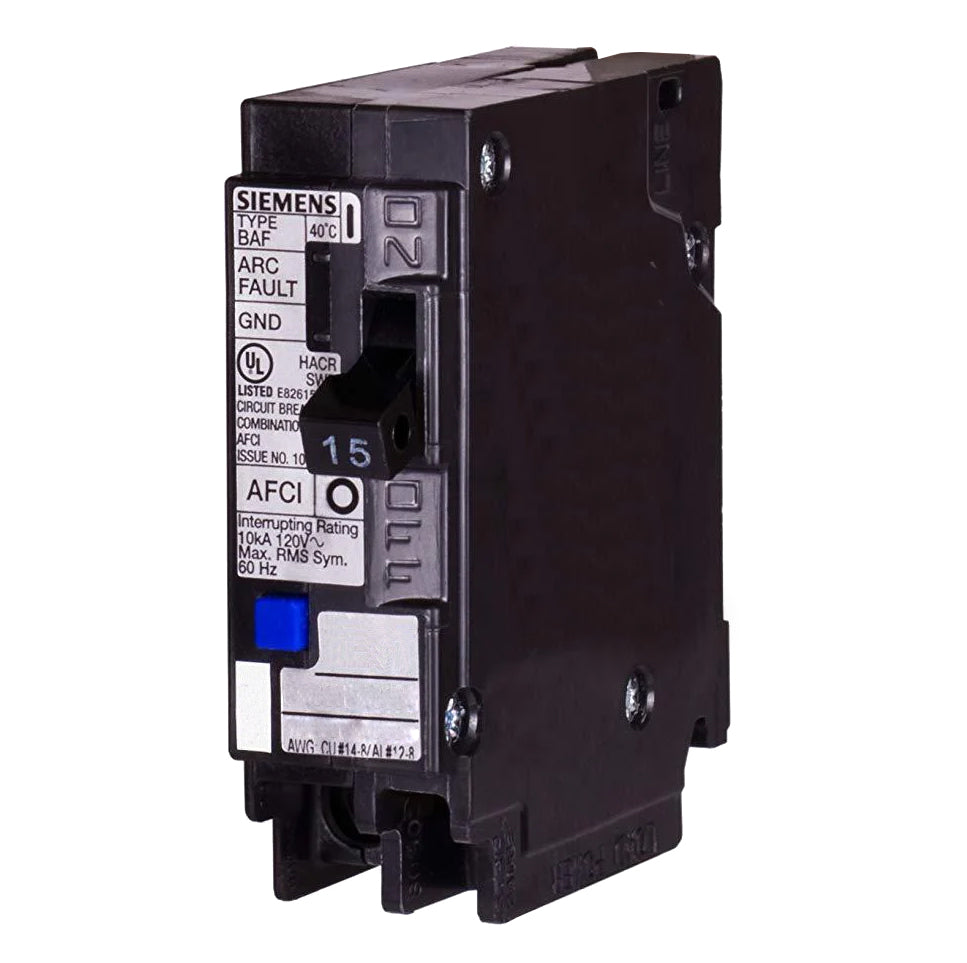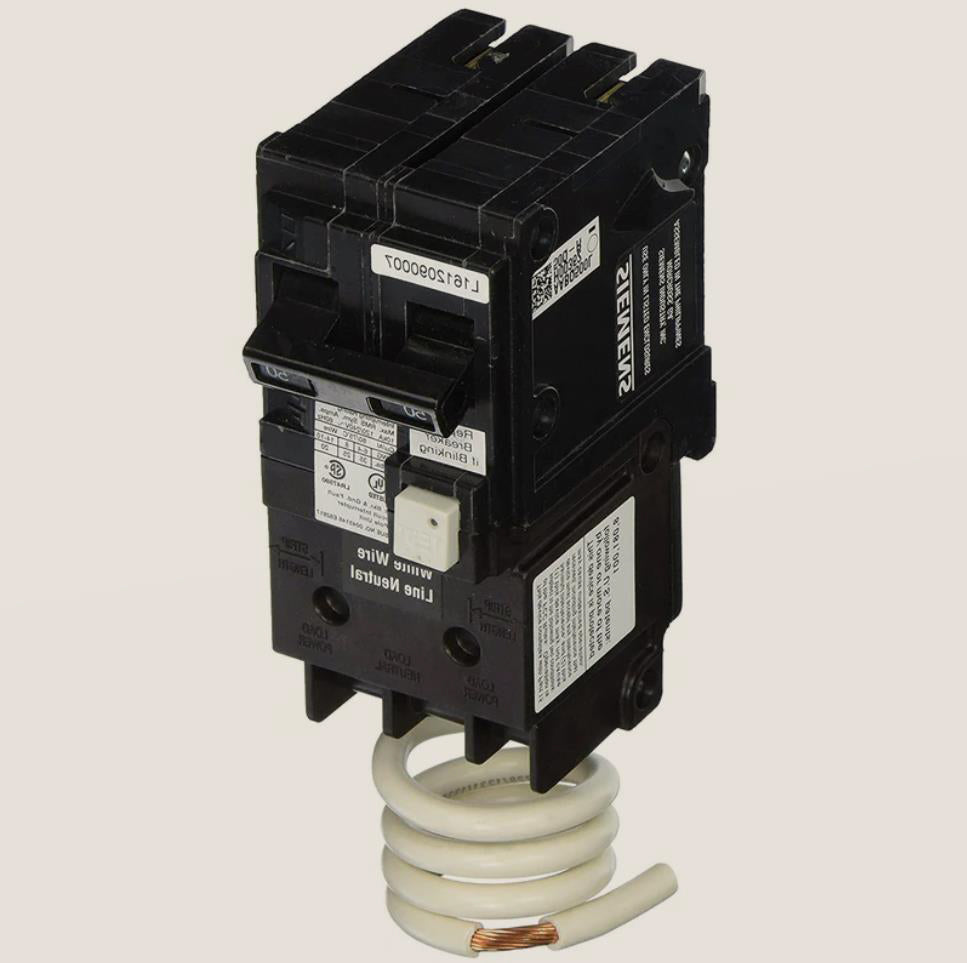In modern electrical systems, safety is of utmost importance. This is where AFCI (Arc Fault Circuit Interrupter) and GFCI (Ground Fault Circuit Interrupter) come into play. These circuit breakers play key roles in preventing electrical hazards. While both protect against electrical faults, they serve different purposes.
For instance, imagine a scenario without AFCI or GFCI protection: A family is enjoying a peaceful evening in their living room when suddenly, an unnoticed arc fault ignites a fire within the walls. Without the early detection and intervention provided by AFCI breakers, the situation escalates quickly, endangering lives and causing extensive property damage. Similarly, in the absence of GFCI protection, a simple appliance malfunction in a bathroom could result in a fatal electrical shock.
If you want to know the difference between afci vs gfci and how they contribute to electrical safety, then this article is right for you.

AFCI Breakers: Protection from Arc Faults
AFCI protection is designed to prevent fires by detecting unusual power spikes indicating an arc fault.
But first, what is an arc fault?
An arc fault is an electrical event characterized by a high-voltage, low-current discharge that occurs when insulation or wiring is damaged. These faults can cause dangerous electrical fires if not promptly detected and mitigated. Understanding the difference between an arc fault circuit interrupter vs. ground fault circuit interrupter is crucial: AFCIs prevent fires caused by arc faults, while GFCIs protect against electric shocks in damp or wet environments.
In AFCI Breakers, two types of arc faults are addressed: the parallel arcs, which occur when electricity jumps between 'live' and 'neutral' wires in close proximity, and series arcs, which happen when electricity arcs over a break within a single live' wire.
AFCI protection comes in various forms, including stand-alone receptacles or in combination with GFCI in breakers.
So how does AFCI work?
AFCI breakers continuously monitor the electrical waveform, looking for abnormalities that indicate an arc fault. When detected, they trip to interrupt the circuit, preventing a potential fire.
Where They're Used:
Note that AFCI protection must be installed at the electrical panel in readily accessible locations for easy operation, renewal, or inspection. It is required in various rooms in one and two-family homes and multifamily buildings, including family rooms, kitchens, living rooms, dining rooms, libraries, parlors, bedrooms, dens, recreation rooms, sunrooms, closets, laundry areas, hallways, and other living areas to reduce the risk of fires caused by arc faults. Additionally, AFCI protection is necessary in any of these rooms or areas where branch-circuit wiring is modified, replaced, or extended.

GFCI Breakers: GFCI - Guard Against Ground Faults
GFCI protection is commonly installed in moisture-prone areas like kitchens, bathrooms, and outdoor spaces. It works by monitoring the current flow between the neutral and live wires, tripping to cut power at the slightest imbalance, thereby preventing electric shock. GFCI devices can be installed as receptacles or integrated into breakers to protect the entire circuit. When comparing AFCI vs GFCI, AFCIs prevent fires caused by arc faults, while GFCIs protect against shock risks in wet environments.
What They Do: GFCI breakers protect against ground faults, which occur when electrical current flows through an unintended path, such as water or a person.
How They Work: GFCI breakers monitor the imbalance in current between the hot and neutral wires. If they detect a mismatch, indicating a ground fault, they trip to interrupt the circuit, preventing electrical shocks.
Where to Use GFCI Devices?
GFCI protection is required in areas where water is present, such as bathrooms, kitchens, and outdoor outlets, to reduce the risk of electrical shocks. For a comprehensive list of locations requiring GFCI protection, you can refer to NEC.
AFCI and GFCI Breakers in Solar Systems:
When integrating a solar panel system into your electrical system, it's essential to consider AFCI vs GFCI protection. While the NEC (National Electrical Code) doesn't explicitly require AFCI or GFCI protection for solar installations, local regulations may vary. However, incorporating these protections can enhance the safety of your solar system.
AFCI Protection in Solar Systems:
Consider using AFCI breakers in your solar system to detect and mitigate arc faults in the wiring or panels, reducing the risk of fires. AFCI protection can add an extra layer of safety to your solar installation, especially in areas where arc faults may occur due to environmental factors or equipment malfunctions.
GFCI Protection in Solar Systems:
While GFCI protection may not be mandatory for solar installations, installing GFCI breakers can add an extra layer of safety, especially in areas prone to moisture or water exposure. GFCI protection can help prevent electrical shocks and ensure the safe operation of your solar system.
Benefits of AFCI and GFCI Protection:
1. Enhanced Safety - Both AFCI vs GFCI breakers provide enhanced safety by detecting and mitigating electrical faults that can lead to fires or shocks.
2. Code Compliance - Installing AFCI and GFCI protection ensures compliance with electrical codes and standards, which are designed to protect homeowners and property.
3. Preventative Maintenance - AFCI and GFCI breakers can help identify potential electrical issues before they become serious problems, allowing for preventative maintenance.
4. Insurance Discounts - Some insurance companies offer discounts for homes with AFCI vs GFCI protection, as they are seen as safer and less prone to electrical hazards. This can also offset the initial cost of breakers.
5. Peace of Mind – While arc fault circuit interrupter vs ground fault circuit interrupter breakers may have higher upfront costs, the safety and protection outweigh the initial investment. Also, knowing that your electrical system is protected by AFCI and GFCI breakers can provide peace of mind, especially in areas prone to electrical faults.
Quick tip: Regular testing of AFCI and GFCI breaks is a must to ensure functionality. Do a monthly check by simply pressing the test button on the breaker. If the breaker trips, then you are good to go (don’t forget to reset after testing).
Always Consult a Professional:
As always, safety first. When planning your solar panel installation, it’s best to leave it to the professionals. Also discuss with them or your qualified electrician about local regulations, safety standards, and the best approach for arc fault circuit interrupter vs ground fault circuit interrupter protection.
When it comes to Solar products, Nature’s Generator stands out as a top choice in the industry. One of their flagship products is the Powerhouse, which offers a maximum power output of 120V/240V 7200Watt, capable of single-handedly addressing all your home power requirements. For more information on the best home solar-powered systems and to get assistance in determining the right setup that adheres to safety requirements, feel free to get in touch with the Nature's Generator team here.
Final Thoughts
AFCI vs GFCI breakers are essential components of a safe and efficient electrical system. If you prioritize your family’s safety, then having these breakers is a must. When integrating a solar panel system into your home, consider the benefits of AFCI and GFCI protection to enhance the safety and reliability of your solar installation. Consult with a qualified installer or electrician to ensure proper installation and compliance with local regulations, ensuring that your solar system operates safely and efficiently for years to come.
* We want to give credit where credit is due. Professional writer, Michelle Gamana, contributed research and content to this blog titled: AFCI vs GFCI Thank you, Michelle, for your contributions!










